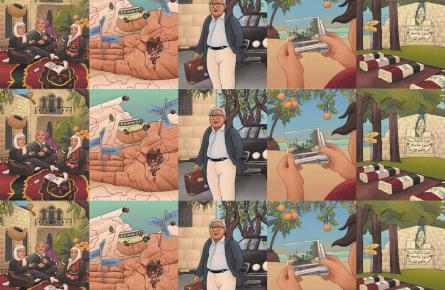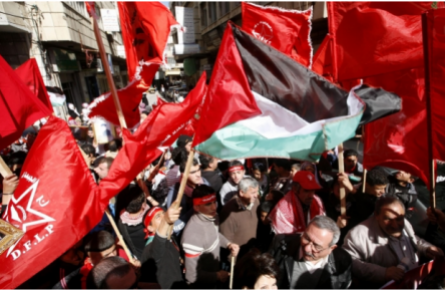Editor's Note: This article is part of the Press on Palestine series, an initiative by Palestine Square. It includes selections from February 2022. Press on Palestine highlights bias in mainstream American reporting on Palestinian and Arab-Israeli affairs.
Two recurrent themes stand out when analyzing bias in U.S. mainstream media coverage on Palestine in February. The first is the uncritical regurgitation of the Israeli narrative, which denies the systemic violence inflicted on Palestinians, and which demands that Palestinians be perfect victims in order to earn humane treatment. The second is the omission of important developments in Palestine to conceal Israeli crimes, which reinforces the denial of the systemic nature of Israel’s violence.
The denial of systemic violence
- The New York Times – Feb. 12, 2022
As Violence Rises in the West Bank, Settler Attacks Raise Alarm by Patrick Kingsley
In his report on settler violence, Kingsley presents the “two-tier legal system in which settlers who commit violence are rarely punished, while Palestinian suspects are frequently arrested and prosecuted by military courts.” However, this recognition is contextualized using Israeli talking points, including Israel’s “defense” minister announcing patrols around “flashpoints,” and a proclamation that “settler attacks are carried out by an extremist minority, condemned by Israeli officials, and do not involve the vast majority of Israeli settlers.” In November 2021, UN experts expressed their concern about the “ubiquity of these attacks” and “the deep state support provided by Israel to the illegal settlement enterprise,” including Israeli security forces’ actions to “actively support the settlers.” These statements directly contradict the Israeli narrative, which is regurgitated by The New York Times. The report goes on to mention that such attacks lead to Palestinians being dispossessed of their land, without mentioning that the Israeli state bears the main responsibility for land grabs. Kingsley also fails to mention that such settlements are typically legalized by Israel, not merely afforded protection.
These presentations have two important effects. First, decontextualizing settler crimes negates the fact that settler attacks are just one part of a whole system of violence inflicted by the Israeli regime on Palestinians. Second, they contribute to the impunity of the Israeli state by treating it as a mere bystander in the oppression of Palestinians when it is, in fact, the principal perpetrator.
- The Wall Street Journal – Feb. 1, 2022
Israel’s Military to Remove Two Officers Over Death of Elderly Palestinian-American by Thomas Grove and Fatima AbdulKarim
- The New York Times – Feb. 1, 2022
Israeli Commanders Disciplined in Death of Palestinian-American Man by Raja Abdulrahim
- The Washington Post – Jan. 31, 2022
Israeli military disciplines three officers in death of elderly Palestinian American by Shira Rubin and Erin Cunningham
On January 12, Israeli soldiers stopped Palestinian-American Omar As’ad as he drove to his home in the village of Jiljiliya, near Ramallah. They beat, bound, blindfolded and gagged Mr. As’ad. As the soldiers left, they released the zip tie around his wrists and left him lying on the ground. He was unconscious. By the time other Palestinians – who had also been detained, then released – got to him, Mr. As’ad was already dead. Under pressure from the U.S. administration, the Israeli army conducted an investigation into the case, which found “moral failure and poor decision-making on the part of the soldiers.”
Palestinians are routinely murdered by Israel Occupation Forces (IOF). By highlighting Mr. As’ad’s case as an anomaly, this coverage attempts to individualize such incidents. The three papers each report the Israeli military investigation with little critical engagement, centering the official Israeli narrative of a few bad apples in an otherwise disciplined and moral army. For example, The Washington Post includes a quote from an IOF spokesperson stating “I expect that every soldier and officer will know how to fight while also preserving human dignity and the ethics of the IDF,” without challenging this claim or giving any evidence to challenge (or support) it. This contrasts with the treatment of Palestinian voices – there are only a few short quotes from eyewitnesses. The only critical opinions noted come from Israeli organizations and U.S. politicians.
The demand for perfect victims
The coverage of Omar As’ad’s case also follows a pattern of media bias around whose deaths count. Mr. As’ad’s death received far more attention than when other Palestinian-Americans have been killed by Israeli Occupation Forces. It is important to examine why. Omar As’ad fits the “perfect victim” narrative – he was an elderly man driving back to his home, and was killed after being bound, blindfolded and gagged. He could not be perceived as presenting any form of threat.
This contrasts with the general media silence on previous incidents of Palestinian-Americans murdered by Israelis. For instance, Mahmoud Shaalan, a 16-year-old from Florida, was shot by Israeli soldiers in 2016 at a checkpoint, and was left to bleed to death as an ambulance was prevented from reaching him. While an eyewitness reported that Mahmoud had his hands up in the air as he approached the checkpoint, Israeli soldiers claimed he was trying to attack them with a knife. In 2014, Israeli forces shot dead Orwa Hammad, a 14-year-old from Louisiana, and claimed he was throwing a Molotov cocktail when Israeli soldiers shot him. Eyewitnesses reported he had been among a group of Palestinians throwing stones. Neither of their deaths were reported in the same way as Omar As’ad’s. Both Mahmoud and Orwa – children – were denied empathy or concern from American outlets and the U.S. government after the Israeli Occupation Forces presented them as threats.
Bias through omission
In February, Israeli lawmaker Itamar Ben-Gvir set up a make-shift office in the yard of a Palestinian family home in the Sheikh Jarrah neighborhood of Jerusalem. He was accompanied by hundreds of settlers, who attacked Palestinian residents and supporters. The settlers used their fists, feet, pepper spray, tear gas, stun grenades, rubber bullets and skunk-water cannons to injure dozens of Palestinians. Fatima Salem, whose house was invaded by the Israeli parliamentarian and his mob, was pepper-sprayed and beaten by settlers and soldiers.
Also in February, Amnesty International released a report (Israel’s Apartheid against Palestinians) that presented findings of a four-year investigation into Israel’s “intent to create and maintain a system of oppression and domination over Palestinians.” Although the report falls short in several aspects, it concludes that Israel is an Apartheid regime.
Neither of these developments pertaining to Palestine were covered in the pages of The New York Times nor The Wall Street Journal. The Washington Post’s coverage was limited to Amnesty’s report. These events were significant enough to suggest that refraining from reporting on them was a conscious choice by the editorial teams at these outlets – especially since Human Rights Watch and Amnesty are frequently consulted by journalists. A similar choice was made in January when Israeli Occupation Forces assaulted Palestinians in the Naqab for several days, as they faced off against Israel’s greenwashing campaigns, to general silence from these mainstream U.S. media outlets. These acts of omission are not new, and constitute a commitment by these outlets to conceal news related to Israel’s daily crimes. In the Press on Palestine May 2021 edition, it was noted that “cursory attention [was paid] to what was going on in Sheikh Jarrah… [until] Palestinian factions started firing rockets from Gaza, [when] wall-to-wall coverage began.” Indeed, the consistency of Israel’s violations highlights these outlets’ concealing Israel’s systemic violence.




